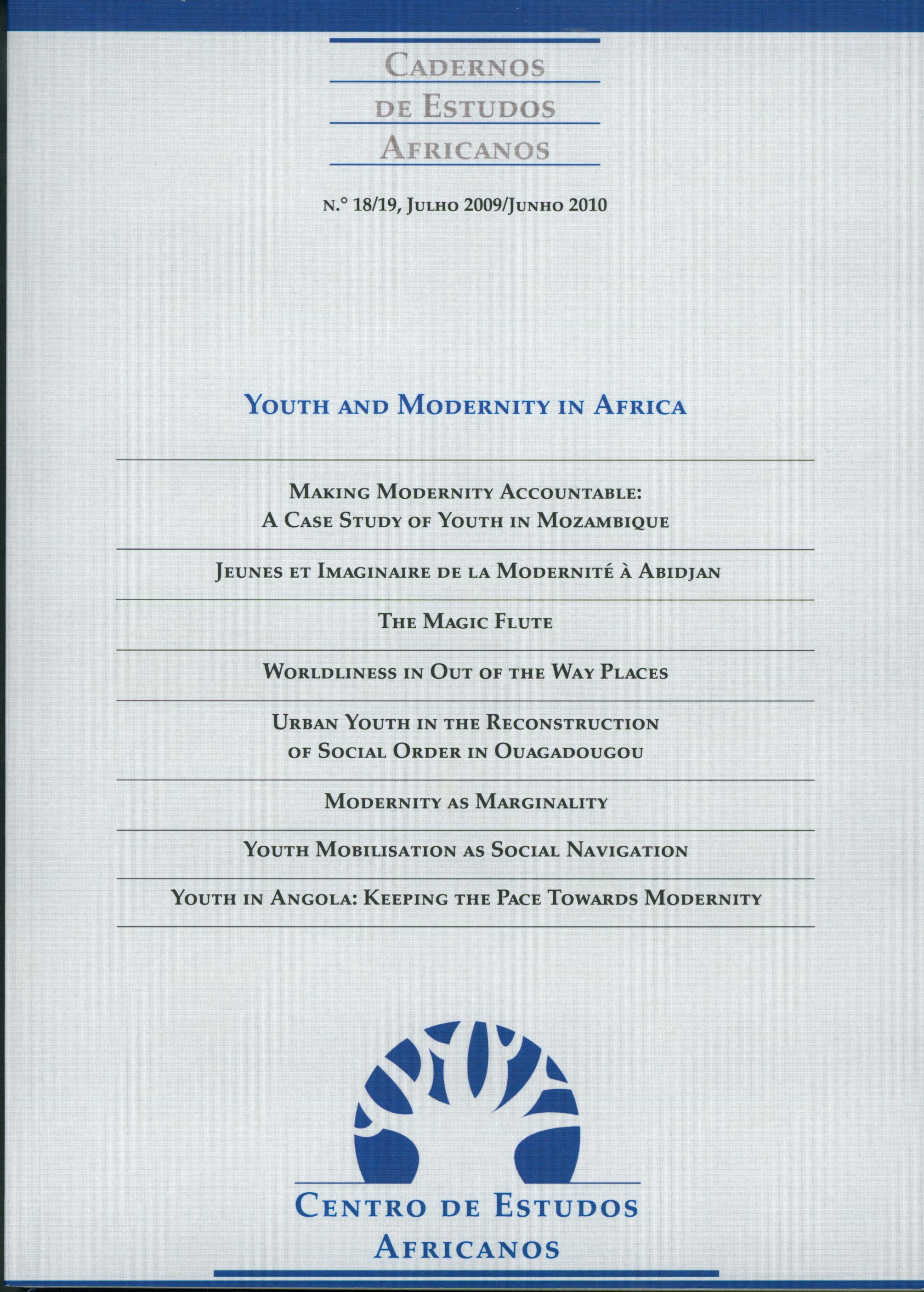Urban Youth in the Reconstruction of Social Order in Ouagadougou: Generational mobility as an indicator of social dynamics
DOI:
https://doi.org/10.4000/cea.99Keywords:
youth, modernity, urban social dynamics, Burkina FasoAbstract
The aim of this paper is to analyze information based on a survey of young urban people in the city of Ouagadougou, Burkina Faso, looking at the way in which their position is clearly articulated in urban social dynamics. The hypothesis defended is that the emergence and evolution of the youth group stresses a movement which is at the heart of the reproduction and transformation of the entire society. To better understand the historical function of youths, the sketch of this sociology of generations will revisit the theoretical notions and make a critical comparison of this polysemic conceptualisation of a practical process in the roots of evolution. This dynamics is only visible in the observation of individual and collective strategies, but simultaneously represents the ratio of youths in the ancient order of things. It is the collective social position, the youthful social ideal and the forms of generational stabilization in the general course of history. The paper ends with a presentation of a theoretical attempt to formulate a strictly sociological design of the concept of “youths”, which will enable practical usage of a category hitherto marked a priori by common sense.References
Assayag, Jackie (2005). La mondialisation vue d’ailleurs. L’Inde désorientée. Paris, Seuil.
Autrement (2005). “Migrations entre les deux rives du Sahara”, 36.
Bachelard, Gaston (1968). La formation de l’esprit scientifique. Paris, Vrin.
Baroin, Catherine (2001). “La contestation chez les Toubou du Sahara central”, Études rurales, 1-2, 157-158.
Bourdieu, Pierre (1984). “La «jeunesse» n’est qu’un mot”, in Questions de sociologie. Paris, Minuit.
Comaroff, Jean and John Comaroff (2000). “Réflexion sur la jeunesse. Du passé à la postcolonie”, Politique africaine, 80, 90-110.
Cugno, Alain (2008). “L’hospitalité entre générations”, Projet 305, numéro spécial.
DOI : 10.3917/pro.305.0067
Dolby, Nadine (2006). “Popular culture and public space in Africa: The possibilities of cultural citizenship”, African Studies Review, 49 (3), 31-47.
DOI : 10.1353/arw.2007.0024
Ela, Jean-Marc (1983). La ville en Afrique noire. Paris, Karthala.
Elias, Norbert (1981). Qu’est-ce que la sociologie?. Paris, Pandora.
Gable, Eric (2000). “The Culture Development Club: Youth, neo-tradition, and the construction of society in Guinea-Bissau”, Anthropological Quarterly, 73 (4), 195-203.
DOI : 10.1353/anq.2000.0010
Jeffrey, Craig (2008). “Generation nowhere: Rethinking youth through the lens of unemployed young men”, Progress in Human Geography, 32 (6), 739-758.
DOI : 10.1177/0309132507088119
Jeffrey, Craig and Linda McDowell (2004). “Youth in a comparative perspective: Global change, local lives”, Youth and Society, 36 (2), 131-142.
DOI : 10.1177/0044118X04268375
Kinda, Fatoumata and Jean-Bernard Ouédraogo (1994). Jeunes, emploi, logements et solidarités dans la ville de Ouagadougou. Ouagadougou, MFAC.
Lagrée, Jean-Charles (2004). “Review essay: Youth, families and global transformations”, Current Sociology, 52 (1), 103-110.
DOI : 10.1177/0011392104039320
Lefort, Claude (1978). “Machiavel et les jeunes”, in Les formes de l’histoire. Essais d’anthropologie politique. Paris, Gallimard.
Maira, Sunaina and Elisabeth Soep (2004). “United States of Adolescence? Reconsidering US youth culture studies”, Young, 12 (3), 245-269.
Mannheim, Karl (1990). Le problème des générations. Paris, Nathan.
Mead, Margaret (1979). Le fossé des générations. Paris, Denoël/Gonthier.
Muchembled, Robert (1988). L’invention de l’homme moderne. Culture et sensibilités en France du XVe au XVIIIe siècle. Paris, Fayard.
Naville, Pierre (1972). Théorie de l’orientation professionnelle. Paris, Gallimard.
Ouédraogo, Jean-Bernard (2008). Identités visuelles en Afrique. Nantes, Amalthée.
Passeron, Jean-Claude (1991). Le raisonnement sociologique. Paris, Nathan.
Piermay, Jean-Luc (1993). “Les jeunes dans les dynamiques sociales contemporaines: Une rupture?”, in Jeunes, ville, emploi. Quel avenir pour la jeunesse africaine?. Paris, Ministére de la Cooperation et du Développement.
Sayad, Abdelmalek (1999). La double absence. Des illusions de l’émigré aux souffrances de l’immigré. Paris, Seuil.
Sgritta, Giovanni B. (2008). “Raisons culturelles et raisons pratiques: La famiglia lunga”, in Cavalli, Alessandro, Vincenzo Cicchelli and Olivier Galland (dir.), Deux pays, deux jeunesses? La condition juvénile en France et en Italie. Rennes, PUR.
Shorter, Edward (1977). Naissance de la famille moderne. Paris, Seuil.
Sykes, Karen (2003). “Introduction: The ethnography of children’s and youth’s work in the age of capitalist restructuring”, Critique of Anthropology, 23 (1), 5-16.
DOI : 10.1177/0308275X03023001809
Van de Velde, Cécile (2008). Devenir adulte. Sociologie comparée de la jeunesse en Europe. Paris, PUF.
Wright Mills, Charles (1967). L’imagination sociologique. Paris, Maspero.
Zegeye, Abebe (2004). “Of struggles and whistles: Mamelodi’s black youth culture”, Current Sociology, 52 (5), 850-878.
DOI : 10.1177/0011392104045375
Downloads
Published
Issue
Section
License
Copyright (c) 2016 Cadernos de Estudos Africanos

This work is licensed under a Creative Commons Attribution-NonCommercial-ShareAlike 4.0 International License.
I authorize the publication of the submitted article/review of which I am the author.
I also declare that this article is original, that it has not been published in any other way, and that I exclusively assign the publication rights to the journal Cadernos de Estudos Africanos. Reproduction of the article, in whole or in part, in other publications or on other media is subject to the prior authorization of the publisher Centro de Estudos Internacionais do Iscte - Instituto Universitário de Lisboa.

